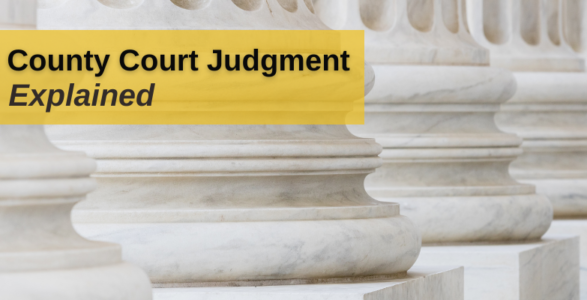IVA: Individual Voluntary Arrangements – An Option For Paying Off Your Debt
Updated 13 November 2024 | published 22 June 2021
What is an Individual Voluntary Arrangement (IVA)?
An Individual Voluntary Arrangement (IVA) is a legally binding agreement between you and your creditors to repay a portion of your debt over a set period. Approved by the court, it obliges your creditors to adhere to its terms.
An IVA can provide flexibility tailored to your needs, but it comes with potential costs and risks. Once completed, any unpaid debt included in the arrangement is written off. IVAs can be structured as monthly instalments over a fixed term (usually five years) or as a shorter arrangement involving a lump sum. Some IVAs may combine both methods.
IVAs are available in England, Wales, and Northern Ireland but not in Scotland.
Do You Qualify for an IVA?
To qualify, you typically need:
- Three or more creditors
- Debts totalling at least £15,000
- The ability to make monthly payments (generally a minimum of £100 after essential expenses)
A steady, predictable income is necessary as most IVAs last five or six years. If your income varies significantly, an IVA may not be the best option. You may also qualify if you can offer a lump sum payment.
Debts Covered by an IVA
An IVA can help manage:
- Credit and store card debts
- Council tax arrears
- Mortgage shortfalls
- Utility bills
- Unsecured loans
- HMRC debts (e.g., income tax, NI contributions)
- Overdrafts
- Catalogue and hire purchase debts
Debts Not Covered by an IVA:
- Secured debts and loans
- Mortgage or rent arrears (unless agreed with the lender/landlord, which is rare)
- CSA arrears
- Unpaid VAT bills
- Student loans
- Magistrates’ court fines
- Certain car finance types
- Social Fund loans
- TV licence arrears
How Does an IVA Work?
Role of an Insolvency Practitioner (IP)
Only a qualified insolvency practitioner (IP), typically an accountant or solicitor, can set up and manage an IVA.
Before the IVA is Set Up
The IP will explain all available options and, if an IVA is deemed suitable, prepare a proposal for your creditors. An ‘interim order’ can be applied for in court to prevent creditors from starting bankruptcy proceedings during this period.
IVA Proposal and Creditors’ Meeting
Your IP will review your finances, including monthly income, savings, and assets, to create a proposal. Some assets might be excluded, such as those necessary for work (e.g., a van or car). Your IP then sends the proposal to your creditors and schedules a formal meeting for approval.
For the IVA to be approved, creditors representing at least 75% of the total debt value must agree. Even if some vote against it, the IVA becomes binding on all once accepted.
Repayment Plan
Repayments can be made as monthly payments, a lump sum, or a combination. The IP collects the payments and distributes them to creditors after deducting their fees. If you own property, you may need to re-mortgage during the penultimate year to release funds.
Pros and Cons of an IVA
Advantages:
- Legally binding, preventing creditors from taking further action
- Time-limited, with debt discharged after the repayment period
- Details removed from the Individual Insolvency Register three months after completion
Disadvantages:
- Upfront fees, non-refundable if the IVA is not accepted
- High costs due to the involvement of a qualified IP
- Risk of bankruptcy if the IVA fails due to non-payment
- Potential impact on certain professions (e.g., accountants)
- May affect property ownership, requiring re-mortgaging
- Recorded on your credit report for six years
Costs of an IVA
IP Fees
IP fees can average around £5,000, covering advice, proposal drafting, court application, and ongoing management. Some IPs require payment upfront, while others include fees in monthly repayments.
How to Manage Costs
It’s essential to get quotes from multiple IPs to compare costs. Some offer a free or discounted initial consultation.
What if You Can’t Keep Up with IVA Repayments?
If you fall behind on repayments, the IP may cancel your IVA, potentially leading to bankruptcy. However, not all cancelled IVAs result in this outcome—it depends on the creditors.
Impact of an IVA on Your Credit File
An IVA stays on your credit report for six years and is removed three months after completion. During this time, borrowing more than £500 requires written consent from your IP.
Public Record of IVAs
IVA details are listed in the Individual Insolvency Register and remain there for the duration of the IVA, plus three months after completion.
Car Finance with an IVA
Getting car finance during or after an IVA can be challenging. At Compass Vehicle Services, we specialise in leasing to customers with poor credit, including those with an IVA.
How to Apply
Mention your IVA status when enquiring so our advisers can assist. Once approved, proposals will need the IP’s consent, and written permission must be provided before signing a lease.
For personalised advice, speak with a debt adviser to explore if an IVA is the best solution for you.
Compass Vehicle Services Ltd offer:
nationwide car leasing – bad credit car finance – used car deals – personal leasing – business car leasing – best car lease deals – non-status car leasing
Back to all help and advice articles




